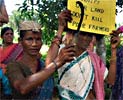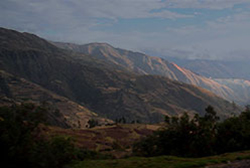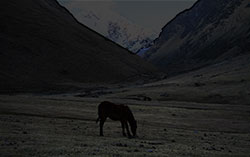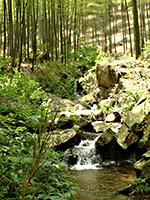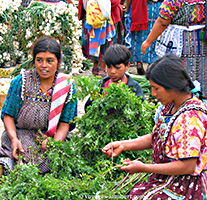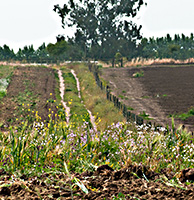A hacienda in Peru – 1938
The Indian peasant leader
It is a moonless night. Stealthily, two dark figures creep by a row of dwellings. The first one softly knocks on a rough wooden door. When it cracks open a bit, he whispers their names. In the small living room hangs an oil lamp on the wall; in front of the window hangs a canvas cloth. About ten men sit in a circle on the ground. Calmly the visitors sit down by them, nodding to left and right. “Are we all here?” the man who opened the door asks in a muffled voice, then continues, “Compañeros, friends, let's begin. Tonight we will talk about establishing a union on our hacienda. I am happy that Saturnino Huillca has come to us.” He looks deliberately at the man who has arrived last.
Then Huillca, a slender Indian peasant around 45 years old with a friendly but resolute face, starts speaking, “Compañeros, also for you it is high time to establish a union. So many peasants have done this already on so many haciendas. For many long years, what am I saying, for generations, landowners have exploited us. Because we have a scrap of land on loan, day in, day out, we have to toil for them, for nothing, without getting even one centavo for it. But now new laws have been adopted in Lima, the capital of our country. Letting people work for you for nothing is now prohibited by law. All peasants are entitled to establish a union, to stand up for their rights, as described in the law.”
A lengthy conversation follows, because the poor peasants don't concede easily. Huillca gets many questions: “Wasn't he himself imprisoned for months?”, “Hasn't he been removed from his land?”, “Aren't his wife and children ill-treated?”, and “Who will help us, when we have to appear at court?” Huillca answers every question calmly and carefully. “Compañeros,” he concludes, “my heart aches, when I see how much you suffer. It is entirely true, that it is an uphill battle to get our rights. But we have to fight, we don't have to let them treat us like animals any longer, but like the hard-working people we are.”
Then, Huillca says good-bye, the door opens, and he slips away in the dark, again together with his younger guide. In Lima good laws are adopted, but here in the far-away countryside a union leader has to come and go like a thief in the night.
_______________________
Source
Huillca: habla un campesino peruano (Huillca: a Peruvian peasant speaks, 1975 – no English translation) from the Peruvian journalist Hugo Neira Samanez is one long and compelling interview with an inspired Indian peasant leader. It reads like a novel.
Go to:
= the next page: The beast - a hamlet in Northern Italy – 1941, story 98.
= the Table of contents, story 97.
